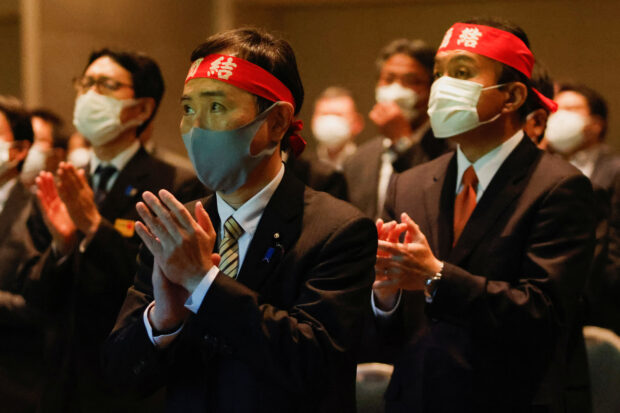
Members of the workers’ union of UA Zensen applaud, during a kick-off rally for the annual “shunto” wage negotiations in Tokyo, Japan March 9, 2023. REUTERS/Androniki Christodoulou/File photo
TOKYO — Japan’s largest industrial union said on Thursday the average pay rise offered by 231 firms for both full-time and part-time employees was the biggest since 2013, amid signs wage hikes were broadening.
The announcement comes a day after Japan’s big manufacturers, led by bellwether Toyota Motor and including Panasonic, Nippon Steel and Nissan, agreed to fully meet union demands for pay hikes at this year’s annual wage talks.
The UA Zensen, an umbrella group established in 2012 that represents 2,237 unions and 1.8 million workers, announced a weighted average 5.9 percent wage increase this year for full-time workers and a 6.5-percent hike for part-timers at the labor talks that wrapped up on Wednesday.
READ: Toyota Motor agrees to biggest wage hike in 25 years
Strong wage growth is expected to stoke sustainable and stable inflation, a prerequisite for an end to negative interest rates.
Bank of Japan pivot
Speculation is growing the Bank of Japan may lift negative rates at its March 18-19 policy-setting meeting next week.
READ: Japan sees growing momentum towards March end to negative rates
UA Zensen workers have sought total wage increase of 6 percent, two thirds of which is to be in base pay hikes, which would push up the wage curves and provide the basis of pay raise, retirement bonus and pension payment.
Last year, Japanese firms offered workers the highest wage hikes in 30 years. Average Japanese workers’ wages had remained stagnant since the asset-bubble burst in the early 1990s.
For the second straight year, UA Zensen’s pay demand exceeded that of Rengo, Japan’s largest trade union confederation, which called for pay hikes of 5 percent or more this year.
UA Zensen represents workers in the service, textiles, distribution and other sectors as well as part-time employees, making it Japan’s largest sector-to-sector union.
Japan’s unionization rate has dwindled in recent years and now languishes below 20 percent.